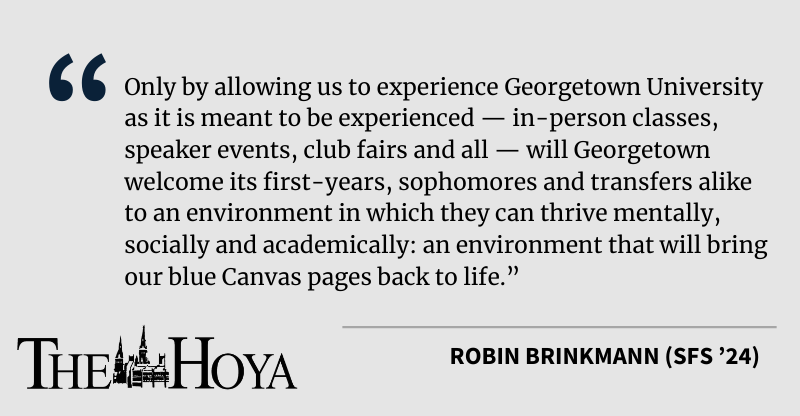Transferring schools is hard. Leaving a familiar environment behind to stake out a place where the rest of your classmates are well established is intimidating, and a successful transfer experience requires resources, support and integration into your new community.
When I opened my transfer acceptance letter to Georgetown University, I finally felt like pieces of my life were falling back into place after months of turmoil and uncertainty. As a senior in high school, I had turned down my first-year acceptance in favor of staying close to my family because of the COVID-19 pandemic. Now, almost a year after receiving my first decision letter from Georgetown, my second acceptance confirmed I would spend the rest of my college years on the Hilltop. I was so excited; COVID-19 had already interfered with enough of my university plans, and I couldn’t wait for everything to run smoothly after I started at Georgetown in the spring.
That excitement came before the pandemic knocked my plans off course again, as Georgetown announced it would not invite most students back to campus for the spring semester. While I understood this decision, it has made this semester incredibly isolating for me and fellow transfer students who matriculated to Georgetown this year. While I am so grateful to be attending Georgetown this semester, the detachment that comes with online school, coupled with the alienation inherent to being a new transfer student, hasn’t really put me in the Hoya Saxa spirit. I am enjoying my classes, but I feel completely detached from Georgetown itself. Being online makes it seem like I am still a student at my old university who just happens to have a new blue-themed Canvas page. The nature of a virtual, off-campus semester has made building a connection to the Georgetown community nearly impossible, and I would bet most first-years and transfers feel the same way.
Georgetown student organizations have offered some supportive resources for new students over the last semester. Virtual retreat weekends with ESCAPE and mentorship programs like Big Hoya Little Hoya can mitigate the challenges of remote learning, but nothing can replace what has been lost by experiencing college through a computer screen. The serendipitous nature by which college relationships form relies on a person-to-person interface: Meeting people at dorms or popular spots around campus, bonding with students sitting nearby in class and making friends at social events are all tried and true ways that friendships have formed in college for decades. New Georgetown students, first-years and transfers, have not had the opportunity to experience these moments, and the consequences of isolation have left a serious impact on the social, emotional and mental well-being of new students. Throughout the pandemic, rates of anxiety, depression and suicidal ideation have skyrocketed among college-aged young adults who have found themselves stripped of community amid extremely stressful global events.
The health of our community has been everyone’s top priority for the last year, and rightfully so. Now, as Georgetown has announced mandatory vaccinations for returning students next fall to ensure students remain physically healthy, the university should do all it can to prioritize the mental well-being of its students. The best way to support new Hoyas moving forward is to allow them to experience what it is like to be Hoyas: To integrate into the Georgetown community, we need to be able to join it in a more typical fashion. Though Georgetown is preparing for a residential return to campus in the fall, the administration has remained conservative in its decision-making regarding class formats and restrictions that will be in place for students next semester. When I look at my schedule for the fall, it’s marked with the same “Online REMOTE” description that has branded the last year of my life.
Georgetown should, of course, prioritize safety during the pandemic. But the consequences of online classes — burnout, loneliness, an inability to connect with classmates and course material — have made themselves abundantly clear since last March. Other institutions, like Brown University, MIT and Middlebury College, have taken the hardships associated with remote learning into consideration and figured out how to safely allow new students to experience normalcy in their collegiate lives by investing in rigorous on-campus testing services and enforcing travel restrictions for residential students. The examples set by these colleges have made it obvious that Georgetown is more than capable of doing the same and allowing students to safely experience college life and classes in a campus bubble.
The psychological impacts of this pandemic have cut deep, and I fear that the longer new Georgetown students are withheld from normalcy, the more likely the lack of connection they feel with each other and to the school itself will have implications far beyond the end of the pandemic. Given that students will be expected to be vaccinated to return to campus in the fall, I believe the university has an obligation to provide a normal campus experience to its students. Only by allowing us to experience Georgetown as it is meant to be experienced — in-person classes, speaker events, club fairs and all — will Georgetown welcome its first-years, sophomores and transfers alike to an environment in which they can thrive mentally, socially and academically: an environment that will bring our blue Canvas pages back to life.
Robin Brinkmann is a first-year in the School of Foreign Service.














